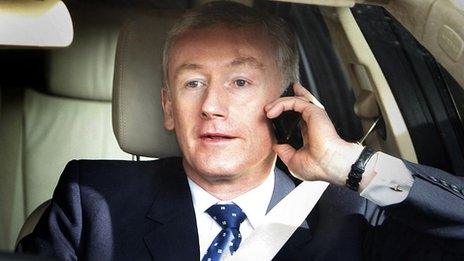Fred Goodwin: A very British humiliation
- Published
- comments

He was known as Fred the Shred, and now there's nothing much left to asset strip from the banker who flew too high.
Three years and four months after the Royal Bank of Scotland was saved from catastrophic collapse, the former chief executive is too much of a pariah to get much work in the UK, his bad reputation is global, he certainly can't work in finance ever again, his family life has gone awry, and now he's lost his title too.
What difference does it make? Well, to Mr Goodwin, he'll have to get his cheque books re-printed. That makes you wonder if he's still an RBS customer.
It may provide some satisfaction to those still angered by Mr Goodwin's behaviour at the bank, and his refusal to give any ground on that super-gold-plated pension - until it was too late and the reputational damage had been done.
But it raises questions for others who have honours and whose business or political careers go into a tailspin, bringing dishonour on the honour system.
Two members of the House of Lords have been jailed; Lord Archer for perjury, Lord Watson for fire-raising. They sit in the upper house of the nation's legislature, but they haven't had their titles removed for serious breach of the law.
Mr Goodwin, by contrast, has not broken any law, other than that of good judgement. The Financial Services Authority went into his role in some depth, and did not censure him.
On the contrary, it found the system's checks and balances had failed where the RBS board of directors did not rein him in, and indeed the regulator itself had failed.
The man we used to call Sir Fred played the high-octane game of low interest rates and aggressive acquisition, which many others were playing.
He happened to play it extremely well, but vastly over-reached himself, particularly with the ABN Amro acquisition, and was most exposed when the music stopped.
Others who worked hard to get their gongs may be wondering just how secure they are now.
The award of honours is strangely, mysteriously British, and the withdrawal of honours is at least as strange. So this is a very British humiliation, coming inexplicably late after the events that brought RBS low.
Taking away an honour does nothing to improve the safety of the banks or enhance the reputation of bankers. It may be the closest we can collectively come to punishment, where the criminal law and contractual pension rights don't offer means of revenge.
Or could this be a decision that's been made to save the reputation of the honours system itself?
- Published31 January 2012

- Published31 January 2012
